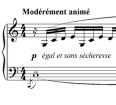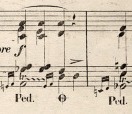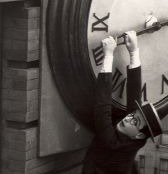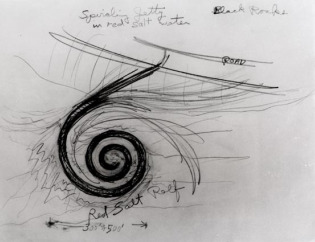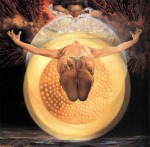In a large suitcase, I'm carrying most of the 400 prescreening CDs submitted by prospective students to New England Conservatory's piano department this year. These recordings come from applicants to the school's bachelor's, master's, and doctoral degree programs, and from applicants to the joint degree program the conservatory has with Harvard University. When I started teaching at NEC five years ago there was no "prescreening" in advance of … [Read more...]
Archives for 2009
Change of venue
In the eighteenth century, there were no concert halls. In 1750, no one would have asked: "Who will write the next great enduring symphony?" Venues develop in response to art, or art and venues develop together in some not entirely explainable relationship (like instruments and music). Halls are instruments too. Can anyone doubt that the 2,000-plus-seat Musikverein/Carnegie/Concertgebouw model is a period piece? It's a manifestation of a … [Read more...]
Early adopters
A composer in his twenties tells me he doesn't use "technology" in his music -- no samples, no interactive computer applications. To me, it's concerning. At a recent Music with a View concert at the Flea Theater, there was new music by three composers using varying amounts and means of interaction between electronics and live performance. In the Q & A after the concert, Morton Subotnick mentioned that he had dreamed of this new world -- a … [Read more...]
Rattle
The pianist Fou Ts'ong played a solo concert in Jordan Hall including Chopin's Opus 35 Sonata. In the famous "Funeral March," he made an unbelievable racket with the left-hand trills. They were noisy, unpleasant, almost veering out of control. In a masterclass at New England Conservatory, during that same visit to Boston, Fou Ts'ong manifested such subtly refined attention to details of sound, and line, and phrase. Everything. But, those trills … [Read more...]
A Year of Pianomorphosis Posts
December 2, 2008: Tending Garden December 3, 2008: Master December 8, 2008: Chill December 15, 2008: Tale of Two Cities December 29, 2008: Pianoscape February 7, 2009: Masterclass February 16, 2009: Can we play too well? February 16, 2009: Flatline February 23, 2009: Bruce Brubaker's Guide to Alliterative Artists February 26, 2009: Across a crowded room March 3, 2009: Play Better March 9, 2009: Global Warming March 11, 2009: We're all composers … [Read more...]
Bachtrauma
Gerhard Richter: Bach (1992) In my dream, J. S. Bach arrives to play on the clavier some of the pieces he's written down, but as he plays, the strangeness of the temperament and lowness of pitch, the flexibility of beat and rhythmic declamation yields some of the things he plays unrecognized, for moments, or even a long while. This music that we own, this familiar canon, under his fingers it is so strange, so far from the received … [Read more...]
Tumbling down
Every performance is an installation, every painting a performance. All poems are music, and every sculpture is a dance. Crayons and brushes are pencil and paper, or computer keyboard, or violin and bow, or space to fill-up on stage in a theater. A pianist is a singer, is a dancer, a maker of line drawings, a teller of tales, a weaver. The designs and stories are new and old. The spinning has never been done before, never … [Read more...]
Extempore
In the Classical music world, it is as if most musicians have forgotten how to talk -- or never learned. They can't communicate with easy ordinary extemporaneous speech. Can't express themselves in daily conversation. Instead, only scripts -- the detailed record, the detailed notation, the traces of music. We are always reading, never speaking for ourselves. Never communicating just what's on our minds or in our hearts. We are mute, unless the … [Read more...]
Just before 8
A few minutes before 8 p.m., my heart beats faster. So many concerts start at this time -- after years in the business my body is trained! The particular ritual of the concert brings a kind of order to living. Concert days culminate in a seventy- or eighty-minute period of time that begins at 8:05, or 8:13 (late ticket buyers still in line). Of course, at Wigmore Hall, this "8 o'clock" is 7:30 (often 7:33), in Rome it's 9. Unlike the … [Read more...]
Case Law
Setting out to learn a piece of scripted classical music, a pianist usually looks at print. Some musicians listen to recordings. A celebrated American violin pedagogue sent her young virtuosos to listen to five or six recordings of a new piece. The kids calculated the speed of each performance with a metronome, averaging the numbers together to determine the right tempo for their own performance -- a focus group for tempo! Other teachers … [Read more...]
Mr. Brendel, thank you
My introduction of Alfred Brendel last night in Boston: In classical music, there are those who believe that thinking about music can compromise feeling -- compromise our emotional response to music. Alfred Brendel's example vividly shows us that such notions are foolish. Mr. Brendel scrutinizes the canonic texts of the piano repertory. He examines the behaviors of piano playing and musical life, and he's shown that deep reflection can yield … [Read more...]
Iowa was the name of the Star
I'm from Iowa. Born there. Grew up there. Studied music there. I wasn't a prodigy. I took lessons from the lady down the street. (Her name was Joy Lord.) In high school, I played concertos with several Iowa orchestras. In a big city, I wouldn't have had the opportunity. I wasn't playing all of Chopin's etudes. Nothing like that. Being there gave me a chance, to dream bigger than I was. What is musical talent? It is an ability to hear and … [Read more...]
Recenter
The "reception" of a piece of music becomes part of its identity. Our performances, recordings, reviews, reactions, lawsuits, teaching, reflection, arrangements, remixes, appropriation -- all of that is the piece, along with the text we started from. Famous music acquires a larger and larger, and more multiply-determined identity. Eventually, there are so many components that none of us can affect the whole very much. When I give the first … [Read more...]
Quality Control
Classical music culture is permeated with judgment making. Maybe it's necessary? Maybe it suits us? We audition musicians to discover who will play better in an orchestra, or to find out which students can develop best in a school. We're always grading and sorting. Critics and conductors announce what pieces are better than other pieces. (Recently, I read about Jean Sibelius's "best" symphony.) It's dangerous. And not because we don't want … [Read more...]
Ascent
There's a certain pride associated with rising melodic lines -- in much nineteenth-century music. Singing soars, and in soaring affirms something very positive about being human. As pitch rises, we might get louder, more tonally intense, more emotional. In other music, high registers are thin. Earlier instruments and techniques may corroborate this thinness: no steel "E" strings on eighteenth-century violins, singing voices differently … [Read more...]

